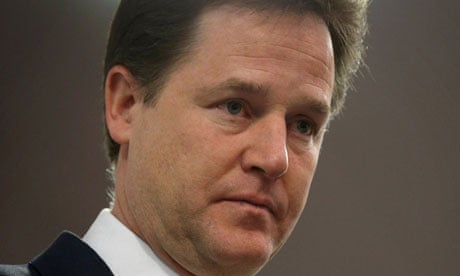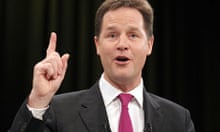The coalition government will come under fresh strain on Tuesday when the commission on a bill of rights publishes its long-awaited report, reopening the question of the UK's legal relationship with Europe.
Eurosceptic Conservative MPs are expected to exploit the document by arguing that the UK should withdraw from the European convention on human rights, while Liberal Democrats will resist attempts to undermine the Human Rights Act.
The report is due be handed to the justice secretary, Chris Grayling, and the deputy prime minister, Nick Clegg, shortly before publication around mid-morning.
It was commissioned more than 18 months ago by David Cameron with the aim of examining whether there should be a UK bill of rights to replace the Human Rights Act introduced by the Labour government in 1998.
The Guardian understands that the eight legal experts on the commission have failed to reach any substantial consensus and that the document will contain dissenting views, if not a minority report. One political source described the outcome as a "real dog's breakfast".
When it was launched critics accused the government of kicking an irresolvable and highly divisive issue into the long grass. A succession of high-profile rulings by the European court of human rights (ECHR) in Strasbourg – such as enforcing prisoners' voting rights – has, if anything, emboldened Eurosceptics over the intervening period.
The terms of reference of the inquiry explicitly prevent the commission from drafting a means of de-coupling the UK from Europe. They state: "The commission will investigate the creation of a UK bill of rights that incorporates and builds on all our obligations under the European convention on human rights, ensures that these rights continue to be enshrined in UK law, and protects and extend our liberties."
Most human rights groups and representatives of the devolved governments in Wales, Scotland and Northern Ireland are determined to safeguard the existing act. They fear any attempt to replace it with a bill of rights would be used as political cover for removing the country from the European convention on human rights.
The government's immediate formal response, in the form of a written ministerial statement, is expected to do little more than acknowledge publication.
But the political parties of the coalition are expected to diverge immediately. A Tory source said: "The Conservatives are likely to respond to it in a different fashion to the Liberal Democrats. As [the justice secretary] has already signalled, there have been some things that we as Conservatives haven't been able to do so far. But as we get closer to [the] election we will be looking at them."
A Liberal Democrat spokesman said: "[The UK is] not about to pull out of the ECHR, certainly not while we are in government. I'm sure that's what some Tory backbenchers will want to use [the commission's report] for."
Earlier this autumn Sir Nicolas Bratza, the outgoing president of the ECHR, questioned why the coalition had launched a bill of rights commission.
"My problem is understanding why it's desirable to introduce a new bill of rights into law," he said. "The Human Rights Act is an extremely skilful piece of legislation which does strike exactly the right balance.
"The [UK] courts faced with it are able to draw upon 50 or 60 years of established jurisprudence [at Strasbourg]. If you start introducing a new bill of rights and possibly new definitions and new provisions which have slightly changed the rights that are already covered by the convention, there's a risk of incoherence creeping in – particularly if it's going to stand side by side with the convention, which will still bind the UK nationally."
Sadiq Khan, the shadow justice secretary, said: "The commission on a bill of rights was always a political fudge. It's not a cross-party committee; Labour was never asked our views on this or even asked to nominate representatives. The commission was designed simply to paper over the divisions within the Tory-led government. Given the rift within the government, it's unlikely there will be any changes to the current law before the next election. Instead, the Tories will be using the findings for their next manifesto – and at a cost of millions of pounds, that must be the most expensive piece of manifesto authorship in history, all courtesy of the taxpayer.
"After all, the Human Rights Act is our bill of rights, and already provides legal protection against torture and slavery, and enshrines in law the right to liberty, to open and fair justice and to protest. It upholds freedom of speech, the right to a private life and to religious freedoms. The Tories aim is to abolish all of these rights and replace them with a new set. The Tories need to admit which rights they think are no longer worthy of protection and be honest with the public that this is about watering down the British people's existing rights."









Comments (…)
Sign in or create your Guardian account to join the discussion